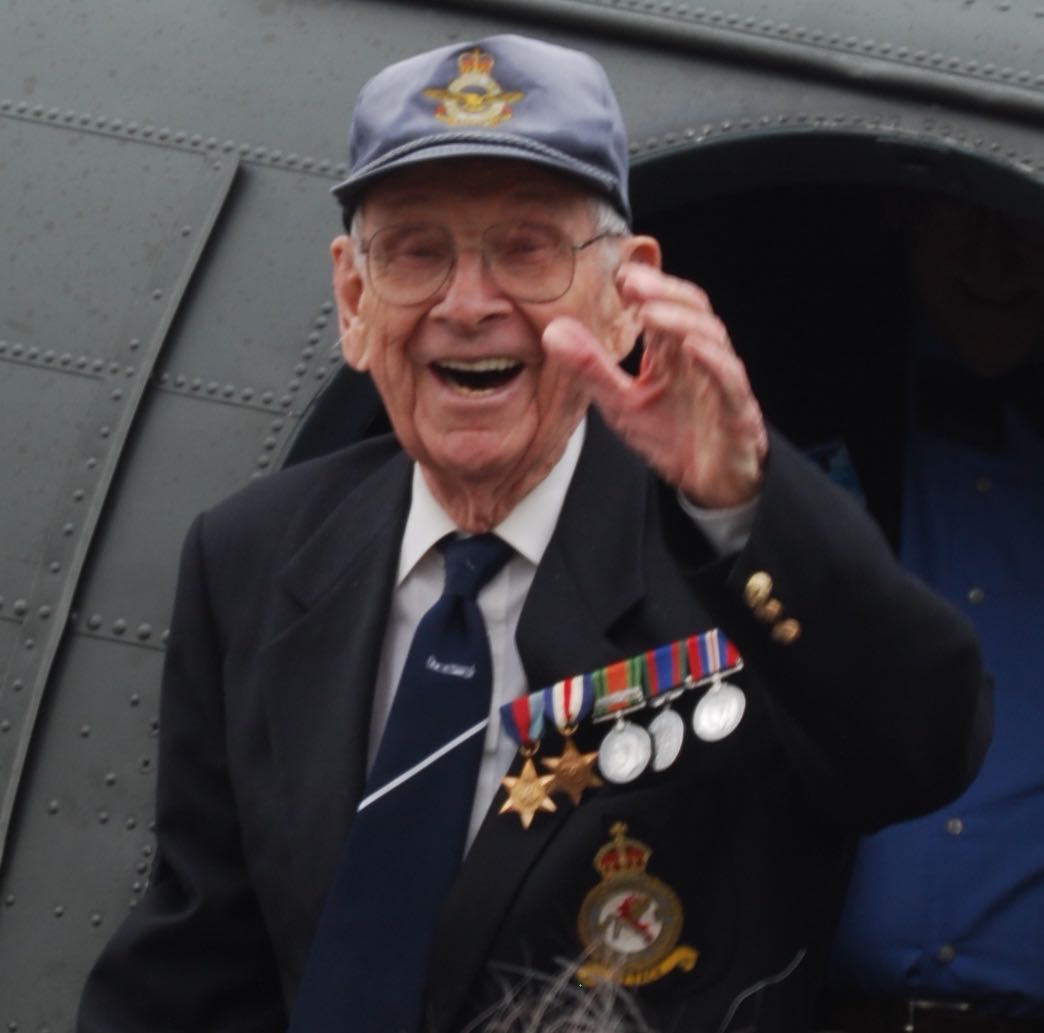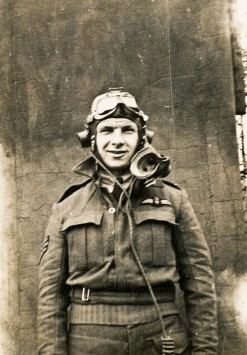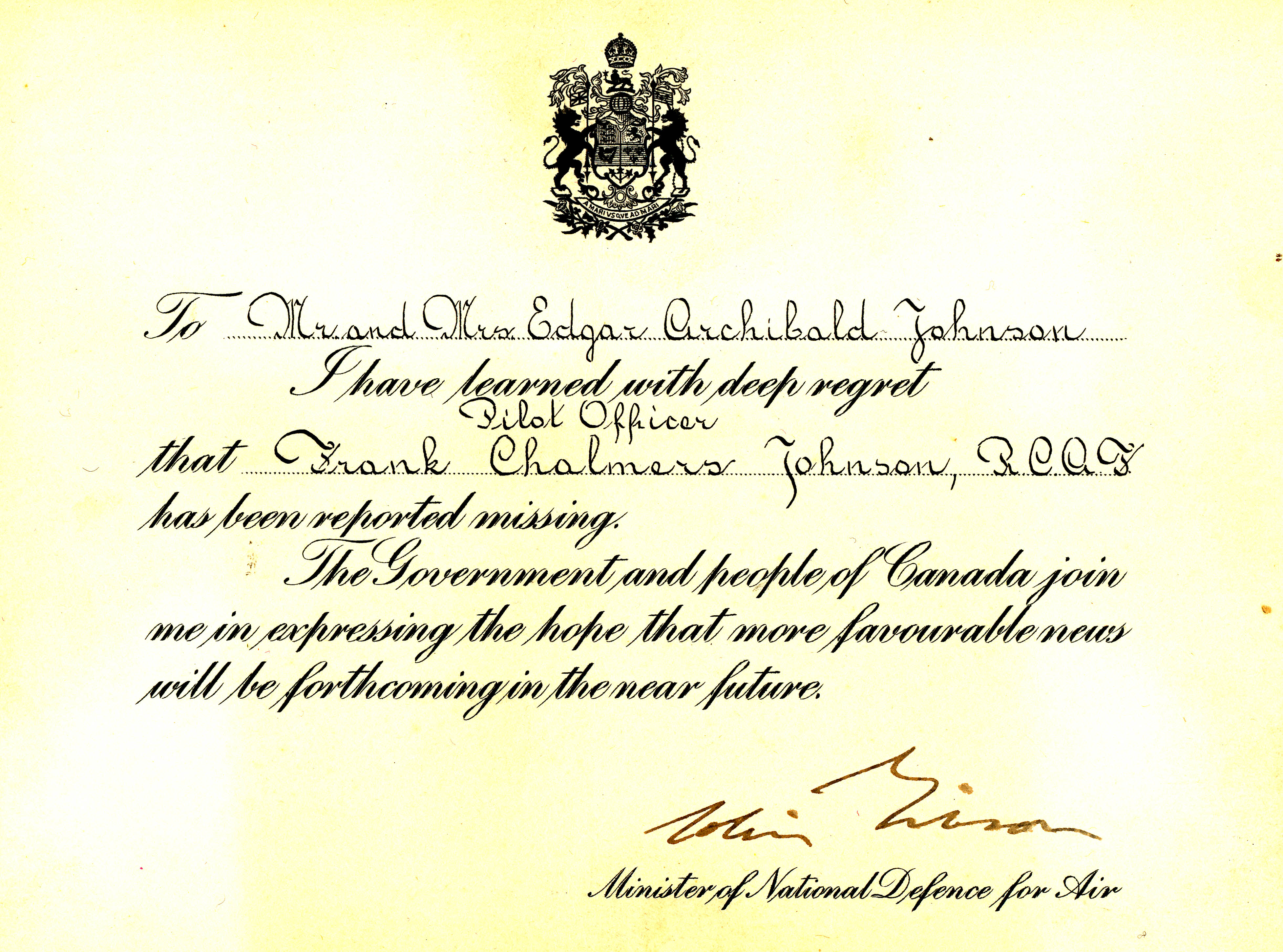


March 19, 1922 - September 24, 2017



Frank was born in York Township, Ontario on March 19, 1922. He grew up in a family of six. We never had a dime in our pockets.
His mother did not want him to join the RCAF. His father was of the same mind. Three of their sons joined up in the services: Frank in the RCAF and two of his brothers in the Canadian Army.
Frank was 17 when he walked to the recruiting office on Bay Street in Toronto. He was told he had to have at least a high school education. He took the attestation papers home. Frank returned to school and got his Grade 13, senior matriculation, then was called up.
My mother and father both came to see me get my wings.
Frank arrived in England in November 1942. While on the parade square, it was announced that the RAF was terribly short of pilots. We would like volunteers, only for three to six months. Volunteers step forward.
There were no volunteers. Thank you, gentlemen.
Frank explained, One, two, three....up to twenty of us were on the train to an A. F. U. that afternoon. I was #15! My stay lasted until September 1945.
At first, Frank flew Hurricanes, then the squadron switched to the Typhoon. The Typhoons were a handful at the start, but beautiful to fly after a few hours. It was very big aircraft -- a fighter! We had the rocket Typhoon. The rockets were slung underneath the wings, four rockets on each wing, making 8 in total. There was a separate firing switch in the cockpit and a cannon switch. The rocket switch was on the throttle on the handle -- salvo or two at a time, depending upon the target. Loading the rockets: they were loaded on rails, plugged and hooked up electronically to the button in the aircraft.
He said, We would raid enemy airfields and one time we were coming back in France, I could see the Eiffel Tower. I pulled off from the group, flew around the tower and came back. I disobeyed an order. They were very unhappy with me because I did not stay in line.
We might not want to keep you on this unit,
I was told. I said, You will!
and they did. I was a rebel, but I did my job. The Wing Commander did not like me because I did not pay him respect for his rank.
Frank was billeted in a nunnery in Vokel, Holland, about 40 miles from Eindhoven.
Another story Frank shared is as follows, The Germans were retreating. We took out the bridges, so the Germans had to take the ferry boats. We were going in at 6000 feet and the heavy anti-aircraft fire was intense, you could almost walk on it I decided I would not go through it, The #2 guy and I flew way down, about 40 miles down the river and at 200 feet above the river, going like hell. We shot through the ferries, salvo...and killed the people on board.
Frank said, Pilots you never got to know very well. We were cordial and at arms' length reach because you might get to know them, have supper with them, and then they get killed.
For the last twenty years of his life, Frank wore hearing aides. I am 90% deaf now. I didn't drop bombs. I fired rockets. I think the rockets were far more accurate than the bombs, but I don't know.
Frank said, We had more trouble with American pilots than with the Luftwaffe.
Frank led 174 Squadron on many attacks at the B Flight Commander. He said, But I was never given the rank, for political reasons. The upper ranks did not care much for Canadians. I got to be a bit mouthy and gave my opinions about the ops and then I was told
He recalled the loss rate of Typhoon pilots. I make the rules here.
We had great success on some of the runs and not so great on others. We lost a few bodies as well. Reading the stories you have written, Anne, has taken me back to those days of horror. I thought I'd grown out of those feelings.It was about 58%. The bomber pilots was 54%. If I knew it was that dangerous, I would have been more careful!
Frank said, What did bother me, near the end of the war: I know I killed people....started to make me feel terrible. I am very proud of -- full of joy when I think of it, based in Holland. I was doing an air test up at 5000 feet doing roll overs, the controller said there is an enemy aircraft over head. About a couple thousand feet below me, I could see the FW.
Why was he here?
I pulled out behind him, alongside him -- almost wingtip -- a young boy was in there. He couldn't have been more that 18 or 19 -- I was 22. He had the look of horror on his face -- he put his hands up to his face to hide himself....the war was almost over. What was the sense of shooting him? I flew back to base. The people did not understand my point of view....they were looking at a kill....I felt good about it. The G/C told me I should have taken him down. He was a young boy, I said. The other guys did not like it. Even back home, I was told I was wrong. In my heart, I was right.
Frank said, The only think I ever did in the whole war that I am proud of is that I did not shoot down that German FW190, piloted by a very young kid. The war was almost over. Killing him would have been murder. I know the war was on and he was the enemy, but to this day, I feel proud of myself.
On March 30, 1945, Frank was shot down and became a POW. I am lucky to be alive and it bothers me even now thinking about it. I was pretty banged up: shrapnel in the right leg, left hit shot, plus a cracked skull when my forehead hit on the ring sight. The German advanced field unit picked me up and believe me, they could not have been more gentle and caring. One of them saw me shivering and took off his greatcoat, putting it around me. They dumped me off at a farm and the woman at the farmhouse really looked after me as if I were her child. She was about 40 and to a 22 year old, she was an old lady and probably now dead. (I told the Red Cross about her care and as recently as five or six years ago, the Red Cross contacted me to see if I could give them more directions as to where the farm was.)
Frank said he never had butterflies nor a case of the nerves during his 110 operations.
XP-W was the Typhoon Frank flew most frequently. I did not fly her when I was shot down. She was in for repairs to the numerous holes from the previous day's activities. W was shot down on April 1, 1945 and lay in a farmer's field in Holland until recently being picked up by a scrap dealer. It is now in England under the care of fellows who hope to restore it. I wish them luck.
www.manstonhistory.org.uk hawkertyphoon.com
LINKS: